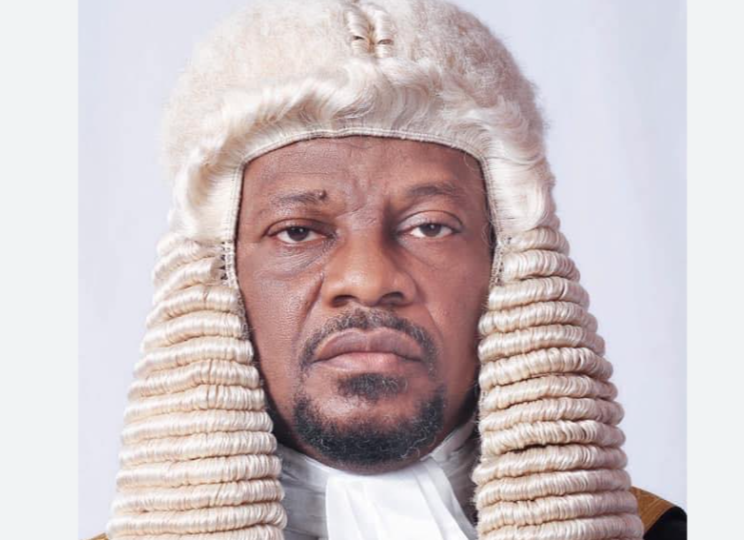
The Court of Appeal sitting in Abuja, on Thursday, affirmed Hon. Martin Amaewhule as the authentic Speaker of the Rivers State Assembly.
The appellate court, in a unanimous decision by a three-member panel of Justices, equally validated the Amaewhule-led members of the Assembly as bonafide lawmakers for the state.
While dismissing an appeal that was lodged before it by Governor Siminalaye Fubara, the court upheld a judgement the Federal High Court delivered on January 22, which nullified the 2024 budget of Rivers State on the premise that it was not presented before members of the state assembly that were known to the law.
According to the appellate court, Fubara, shot himself on the foot when he voluntarily withdrew a counter-affidavit he filed to challenge a legal action the Amaewhule-led lawmakers instituted to be recognised as valid members of the Rivers State House of Assembly.
The court held that governor Fubara’s decision to present the 2024 Rivers State Appropriation Bill to only four out of 31 members of the Assembly, amounted to a gross violation of section 91 of the 1999 Constitution, as amended.
It will be recalled that the Rivers State Assembly was fractionalised owing to the frosty relationship between Governor Fubara and his predecessor and Minister of the Federal Capital Territory, FCT, Nyesom Wike.
In the heat of the fracas, governor Fubara sidelined the Amaewhule-led 26 members of the House that were loyal to Wike and presented the state’s N800billion 2024 budget before the four lawmakers led by Hon. Edison Ehie who had emerged as a factional Speaker of the Assembly.
The Ehie-led faction, which had also declared seats of the Amaewhule-led pro-Wike lawmakers vacant for defecting to the All Progressives Congress, APC, from the Peoples Democratic Party, promptly passed the budget which was quickly assented to by Governor Fubara.
Meanwhile, following the intervention of President Bola Tinubu, both Fubara and Wike signed a peace pact that included the restoration of Amaewhule as the bonafide Speaker of the State Assembly.
The factional Speaker, Ehie, who had approached the court and was joined as an interested party in the suit, subsequently withdrew all the processes he filed before the court and equally rescinded both his seat and his membership of the Assembly.
Whereas Governor Fubara, in line with terms of the peace deal, withdrew all the processes he filed to challenge the suit, however, the pro-Wike lawmakers only withdrew an impeachment notice they served on him while they declined to terminate their legal action.
While deciding the suit, Justice James Omotosho of the high court held that the budget was invalid as it was not properly presented before the Rivers State House of Assembly as required by the law.
It held that Governor Fubara acted like a tyrant when he demolished the Rivers State Assembly complex and withheld funds standing to the credit of the legislative house.
The court also described as unconstitutional, the redeployment of the Clerk and Deputy Clerk of the Rivers State Assembly by Governor Fubara.
Justice Omotosho stressed that the governor lacked the statutory rights to interfere with the operations of the Assembly, adding that he acted in contempt of a subsisting order that barred the parties from taking any steps to overreach the matter that was pending before the court.
Besides, the court held that the National Assembly could not take over the legislative affairs of the state in the absence of the preconditions that were listed under section 11 of the 1999 Constitution, as amended.
Consequently, the court, among other things, nullified all actions the Rivers Assembly took without the participation of the Amaewhule-led members of the House, among which included the presentation of the state appropriation bill.
It issued an order of injunction, restraining Governor Fubara from impeding or frustrating the operations of the Assembly under Amaewhule’s leadership as its speaker.
It ordered the governor to release all funds standing to the credit of the Rivers State House of Assembly.
While upholding the verdict of the lower court, the appellate court held that Fubara conceded to the Amaewhule-led lawmakers when he withdrew all the processes he filed against their suit.
“A party must be consistent in the presentation of its case. A party cannot approbate and reprobate or blow hot and cold at the same time,” the appellate court held.
It held that the orders of the trial court were appropriate given the circumstance of the case, saying the appeal Fubara filed before it amounted to an academic exercise.
Accordingly, it ordered Fubara to pay a cost of N500,000 to each of the Respondents in the appeal marked: CA/ABJ/CV/133/2024.
Source: Vanguard







